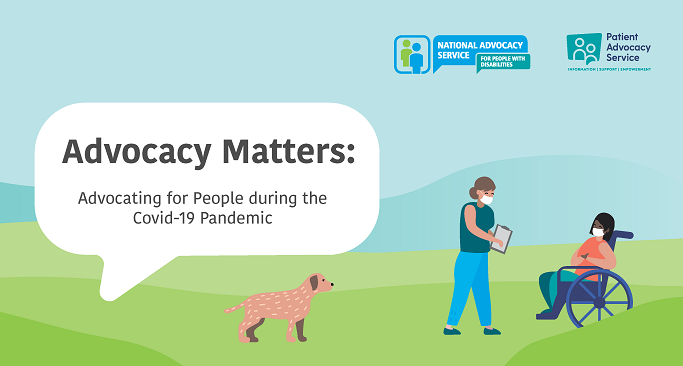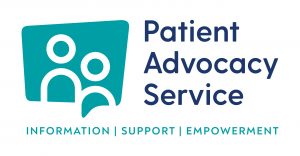
People with disabilities have been among the worst affected groups in Irish society by the Covid-19 pandemic. They have faced traumatising and life changing experiences, including isolation, anxiety and depression, and their views about their own lives have often been overlooked by the Services looking after their care.
These are among the key findings of two new reports titled ‘Advocacy Matters: Advocating for People during the Covid-19 Pandemic’, developed by the National Advocacy Services for People with Disabilities (NAS) and the Patient Advocacy Service.
The first report (open Report 1 / its Executive Summary / Easy-to-Read Version) explains the issues faced by people with disabilities in ‘residential services and day services’ during the Covid-19 pandemic.
The second report (open Report 2 / its Executive Summary /Easy-to-Read Version) explains the issues people with disabilities faced in relation to ‘access to justice and decision making’ during this period.
The ‘Advocacy Matters’ reports focus on the independent advocacy work carried out by NAS and the Patient Advocacy Service during the period March 2020 – March 2021. They outline the experiences of the people supported by the Services, the support the Services provided, and the positive outcomes the Services’ support helped to achieve.
The two reports show the key role that advocacy services play in supporting people who may be vulnerable in Irish society, particularly during periods of crisis.
The reports show the hugely detrimental impact that the pandemic, its restrictions and the subsequent disruptions to healthcare services in Ireland have had on people with disabilities. They convey how Advocates have helped people to have their voice heard and to progress issues and decision making in line with their own wishes.
The reports make it clear that we must ensure that the voice, will and preference, and human rights people with disabilities are always recognised, particularly if we want to ensure the same mistakes are not made if there is a future crisis.
To achieve this, it is imperative that we make sure that people with disabilities are at the centre of decision-making processes, leading decisions about their own lives and providing input into the development of key policies and legislation.
Louise Loughlin, National Manager of the National Advocacy Service for People with Disabilities (NAS), said: “The past year has been a hugely difficult time for all of us, but people with disabilities have been among the worst affected groups in Irish society, dealing with many traumatising and life changing experiences.
“If we want to ensure the same mistakes made during the Covid pandemic are not repeated in a future crisis, we must ensure that the voice, will and preference, and human rights of people with disabilities are recognised. They must be at the centre of decision-making processes, leading decisions about their own lives and providing input into the development of key policies and legislation.”
-
Key findings from the report on ‘residential and day care services’:
Read Report 1 (open Report 1 / its Executive Summary / Easy-to-Read Version) e
NAS statistics show that mental health and well-being has been the biggest single emerging issue for people with disabilities receiving the Service’s support during the Covid-19 pandemic.
Issues include the poor communication of public health guidance to people with disabilities living in residential services, visiting restrictions in residential services, and the withdrawal of day services. People who spoke to NAS Advocates faced prolonged periods without direct contact with their family and loved ones, and they spoke of feeling fearful, anxious and alone.
The closure and reduction of day services also had a serious impact on the mental health of people who lost access to the social interaction and structure, leading to isolation, anxiety and a loss of confidence and skills. Carers have also spoken
When combined with reductions in other public services, including transport, education, housing supports and limited access to technology, this led to a major increase in mental health concerns for people with disabilities.
In response, NAS Advocates have worked to ensure that people with disabilities using residential and day services, particularly those who communicate differently, have had their voice heard and have been able to make their own decisions about issues affecting their lives.
-
Key findings from the report on access to justice and decision making:
Read Report 2 (open Report 2 / its Executive Summary /Easy-to-Read Version)
NAS has found that people with disabilities are often not informed of, or included in making, decisions made about their own lives. This became particularly evident during the pandemic when many decisions were being made on behalf of people with disabilities.
There were also cases of Do Not Attempt Resuscitation (DNARs) orders in hospitals and nursing homes, when no attempt was made to ascertain a person’s own views and wishes, and family members were asked to make decisions on their behalf.
NAS and the Patient Advocacy Service have upheld people’s rights, ensuring their voices are heard and they have fair and equal treatment and access to services. They ensured that decisions were taken with due consideration for a person’s will and preference.
In terms of access to justice, NAS supports parents with a disability involved in legal childcare proceedings. Court hearings were only available in emergency cases and it was difficult for parents to meet legal representatives. NAS has supported people to take part in remote access visits with their children and has worked to ensure the rights of parents have been upheld.
Regarding people who are Wards of Court and are the subject of Ward of Court proceedings, Covid restrictions resulted in lengthy delays to the wardship process, medical reviews and capacity assessments. NAS ensured that people were kept informed and received information in an accessible format.
NAS has supported people with disabilities in relation to safeguarding issues, regarding issues such as abuse and financial concerns. Actions included linking with solicitors in relation to Ward of Court and legal aid, supporting access to psychology and counselling services, and linking a person with the probate office.
NAS also worked with many people at risk of homelessness or living in accommodation supported by homeless services. NAS Advocates helped people to move into accommodation that was more comfortable, accessible and appropriate to their disability support needs.
-
Key Recommendations from the reports:
A human rights-based approach should be the focus of any plans or strategies developed for people with disabilities. This will ensure they are at the centre of the decision-making process during periods of crisis and can provide input into the development of key policies and legislation.
It is crucial that the rights and freedoms of people living in residential services are upheld and restrictions on family visits are lifted. It is also vital that the restrictions preventing people from accessing day services are removed.
Every person should be supported to make their own informed decision in relation to the Covid-19 vaccine and Do Not Attempt Resuscitation (DNARs) orders. It is imperative that health and social care providers engage with advocacy support for the person, particularly in cases where people may not be able to directly communicate their will and preferences.
The Irish government should ensure the Assisted Decision-Making Act 2015 is commenced and the Decision Support Service fully established. Matters such as a person’s capacity to make decisions, or give their informed consent are of paramount importance, and the human rights of the person must be at the centre of these processes.
NAS is fully aware that families’ concerns should be listened to, but not at the expense of the person’s own right to choose for themselves.
In decisions regarding medical care, it is important that guidance is sought from the relevant clinical team to also support the person in establishing the will and preference. Decision making should be based on medical guidance to uphold the person’s human right to health and life.
